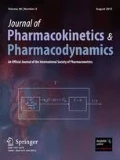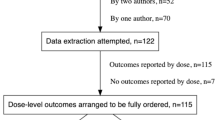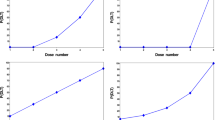Abstract
Phase I studies with anticancer drugs are used to evaluate safety and tolerability and to choose a recommended phase II dose (RP2D). Traditionally, phase I trial designs are rule-based, but for several years there is a trend towards model-based designs. Simulations have shown that model-based designs perform better, faster and are safer to establish the RP2D than rule-based designs. However, the superiority of model-based designs has never been confirmed based on true trial performance in practice. To aid evidence-based decisions for designing phase I trials, we compared publications of model-based and rule-based phase I trials in oncology. We reviewed 172 trials that have been published in the last 2 years and assessed the following operating characteristics: efficiency (trial duration, population size, dose-levels), patient safety (dose-limiting toxicities (DLTs)) and treatment optimality (percentage of patients treated below and at or above the recommended phase 2 dose). Our results showed a non-significant but clinically relevant difference in trial duration. Model-based trials needed 10 months less than rule-based trials (26 versus 36 months; p = 0.25). Additionally, fewer patients were treated at dose-levels below the RP2D (31 % versus 40 %; p = 0.73) while safety was preserved (13 % DLTs versus 14 % DLTs). In this review, we provide evidence to encourage the use of model-based designs for future phase I studies, based on a median of 10 months of time gain, acceptable toxicity rates and minimization of suboptimal treatment.


Similar content being viewed by others
References
Le Tourneau C, Lee JJ, Siu LL (2009) Dose escalation methods in phase I cancer clinical trials. J Natl Cancer Inst 101(10):708–720
Jaki T, Clive S, Weir CJ (2013) Principles of dose finding studies in cancer: a comparison of trial designs. Cancer Chemother Pharmacol 71(5):1107–1114
A Iasonos, J O’Quigley (2014) Adaptive dose-finding studies: a review of model-guided phase I clinical trials. J Clin Oncol 32(23):2505–2511
Le Tourneau C, Gan HK, Razak ARA, Paoletti X (2012) Efficiency of new dose escalation designs in dose-finding phase I trials of molecularly targeted agents. PLoS ONE 7(12):e51039
Harrington JA, Wheeler GM, Sweeting MJ, Mander AP, Jodrell DI (2013) Adaptive designs for dual-agent phase I dose-escalation studies. Nat Rev Clin Oncol 10(5):277–288
Mandrekar SJ (2014) Dose-finding trial designs for combination therapies in oncology. J Clin Oncol 32(2):65–67
European Medicines Agency Committe for Medicinal Products for Human Use, “Reflection paper on methodological issues in confirmatory clinical trials planned with an adaptive design,” 2007. [Online]. Available: http://www.ema.europa.eu/docs/
U.S. Food and Drug Administration (2010) Guidance for industry: adaptive design clinical trials for drugs and biologics 2010. [Online]. Available: http://www.fda.gov/downloads/Drugs/Guidances/ucm201790.pdf
Rogatko A, Schoeneck D, Jonas W, Tighiouart M, Khuri FR, Porter A (2007) Translation of innovative designs into phase I trials. J Clin Oncol 25(31):4982–4986
Eisenhauer EA, O’Dwyer PJ, Christian M, Humphrey JS (2000) Phase I clinical trial design in cancer drug development. J Clin Oncol 18(3):684–692
Zhou Y (2004) Choice of designs and doses for early phase trials. Fundam Clin Pharmacol 18(3):373–378
O’Quigley J, Pepe M, Fisher L (1990) Continual reassessment method: a practical design for phase 1 clinical trials in cancer. Biometrics 46(1):33–48
R Core Team (2014) R: A language and environment for statistical computing. R Foundation for Statistical Computing, Vienna, Austria., 2014. [Online]. Available: http://www.r-project.org/
Sessa C, Shapiro GI, Bhalla KN, Britten C, Jacks KS, Mita M, Papadimitrakopoulou V, Pluard T, Samuel TA, Akimov M, Quadt C, Fernandez-Ibarra C, Lu H, Bailey S, Chica S, Banerji U (2013) First-in-human phase I dose-escalation study of the HSP90 inhibitor AUY922 in patients with advanced solid tumors. Clin Cancer Res 19(13):3671–3680
Author information
Authors and Affiliations
Corresponding author
Ethics declarations
Conflicts of interest
The authors declare no conflict of interest.
Electronic supplementary material
Below is the link to the electronic supplementary material.
Rights and permissions
About this article
Cite this article
van Brummelen, E.M.J., Huitema, A.D.R., van Werkhoven, E. et al. The performance of model-based versus rule-based phase I clinical trials in oncology. J Pharmacokinet Pharmacodyn 43, 235–242 (2016). https://doi.org/10.1007/s10928-016-9466-0
Received:
Accepted:
Published:
Issue Date:
DOI: https://doi.org/10.1007/s10928-016-9466-0




